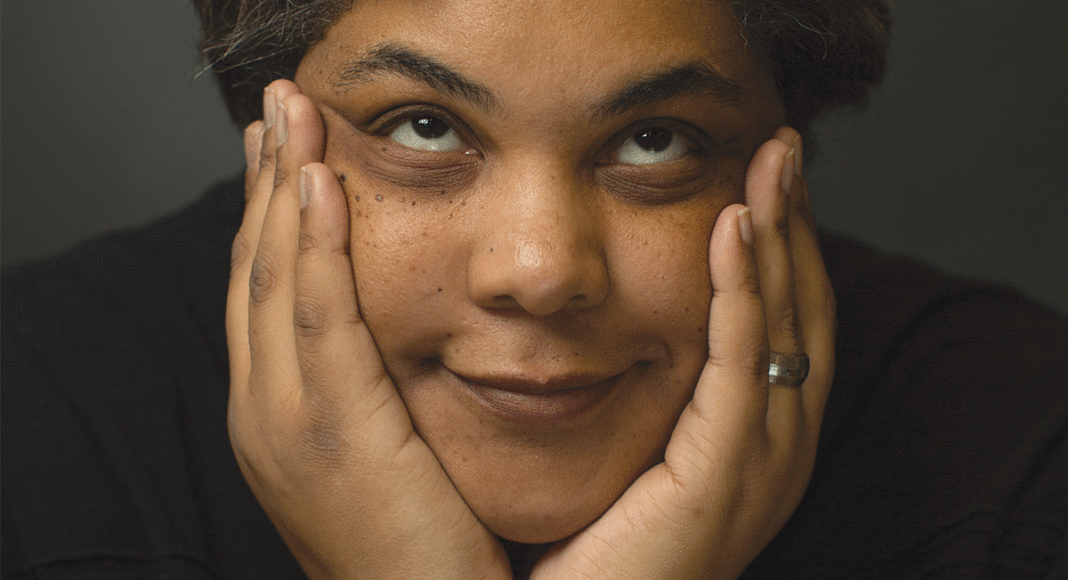Women are often labeled difficult when they are thought to want too much, say too much or demand too much. Even today, they’re more likely to apologize than men, and more often tasked with making others feel comfortable at the expense of their own authenticity. Hillary Clinton personifies the price of challenging those norms.
Roxane Gay doesn’t play that way. Like her celebrated book of essays, Bad Feminist, her new collection of short stories, Difficult Women, turns tropes about women and how they should behave upside down. Gay’s women are troubled, knowing, resilient, sexual, outspoken, and unapologetic. Both her fiction and nonfiction weave great storytelling with reflections of her worldview, which she shared with GT in anticipation of her appearance in Santa Cruz on, perhaps fittingly, Inauguration Day.
How does writing fiction differ for you from writing essays?
ROXANE GAY: With nonfiction, I’m generally responding to the now, but trying to be timeless as well and look beyond what I think to take into account other points of view. One of the great things about fiction is that I’m entirely in control of the world I’m creating. That’s very seductive. I never have an agenda when I’m writing a story. It’s because of who I am and how I see the world that certain themes come up, but my job as a fiction writer, first and foremost, is to entertain.
You’re a pop culture junkie. How does it shape you as a writer and us as consumers?
Pop culture is part of the social discourse about the ways in which we live our lives. Socioeconomics and race, gender and sexuality, all of these things come up in popular culture, so it’s interesting to see how the people who create it are thinking about the world and reflecting it back to us. I’m always thinking about what I can contribute to it. My dad used to tell my brothers and me when we were younger, “do something you love doing, something no one else is doing.” And that has certainly helped me decide what to think and write about.
You recognize that people are inconsistent and imperfect in your writing, which is part of what makes it so strong. How do we navigate the conflicting messages in media without losing ourselves?
What matters is talking about media literacy, making sure that especially younger people understand the media they’re consuming and what shapes it, the issues to representation. It’s important to know what’s at stake, the price we’re paying for our enjoyment. I feel comfortable saying yes, I love the Dirty South rap that was very popular when I was younger, but I also recognize how damaging those messages are, what they’re doing and saying to women. Of course, you have to recognize that those same messages exist in rock ’n’ roll and country music. It’s important to talk about all of it.
On the day after the election, you wrote that though you knew we had to fight to protect American ideals and progressive policies, you didn’t know yet what that fight would look like. Do you have a clearer sense of it now?
We should be thinking very seriously about the candidates who will run in both 2018 and 2020, and doing the work to make sure they’re electable. We also need to stay on top of our legislatures because we have no idea what’s going to happen over the next four years. We can’t just resign ourselves to thinking everything is going to be okay. For many people, it won’t be. Those who barely have health insurance, are poor, or need the safety net and protections the Republicans are trying to destroy—we need to be protecting them as best we can.
Why do you think storytelling is so important during difficult times?
It helps us define who we are as a culture and a people. It’s how we preserve culture, how we understand, how we entertain. Stories are our oldest form of communication. People were telling them before the written word even existed. We have to treasure that.
This offsite Bookshop Santa Cruz event with Roxane Gay will be held at Santa Cruz County Veterans Memorial Building, 846 Front St., Santa Cruz, at 7 p.m. on Friday, Jan. 20. Ticket packages are $27.19, and include one copy of ‘Difficult Women’ and two tickets to the event. Tickets cannot be shipped, must be prepaid, and must be picked up at Bookshop Santa Cruz or at will call (starting at 6:30 p.m.) at the Veterans Memorial Building.













